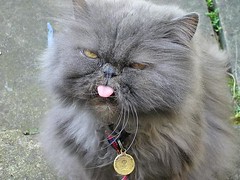In section 8, Schmitt discusses the threat that economic liberalism poses to the concept of the political. “For the purpose of protecting individual freedom and private property, liberalism provides a series of methods for hindering and controlling the state’s and government’s power. It makes of the state a compromise and of its institutions a ventilating system and, moreover, balances monarchy against democracy and vice versa” (70). Furthermore, he states that “no consistent individualism can entrust to someone other than to the individual himself the right to dispose of the physical life of the individual” (71).
I realize that Schmitt grew up in a period and in a country where harsh state control was the norm and that the repression was seen as necessary for the greater good, but I question his assumption that the perpetuation of “the political” is better when given the choice between that and a liberal world. At least in the liberal world, one has free choice and is not expected to offer his life to the “higher purpose” of the state. What is wrong with decrying repression and lack of freedom? According to Schmitt, this leads to a “system of demilitarized and depoliticized concepts” (71) which he implies is negative. My question is this: perhaps I’m not understanding the point he’s trying to make, and if so, please comment, but, aside from making the concept of the political (and therefore a whole treatise on its meaning) completely irrelevant, what is wrong with such a demilitarized, depoliticized world? Perhaps it’s that we would then not be able to differentiate friends and enemies? Why does someone have to fit into one or the other—why can’t someone be part friend and part enemy? That seems to fit more closely with what I’ve learned of human nature—people are rarely ever completely for you or completely against you and are more interested in how their feelings about you will affect them. Please comment if you have thoughts because I think perhaps I’m not understanding Schmitt (I’m on migraine medicine and a bit tripped out, admittedly).
Schmitt mentions that “instead of a clear distinction between the two different states, that of war and that of peace, there appears the dynamic of perpetual competition and perpetual discussion. The state turns into society…the self-understood will to repel the enemy in a given battle situation turns into a rationally constructed social ideal or program. … At the intellectual pole, government and power turns into propaganda and mass manipulation, and at the economic pole, control” (72). Given what has come out as of late about the Bush administration’s lies concerning Iraq on the one hand and the northern hegemony in organizations such as the WTO, IMF, etc., this certainly seems to be the case in our society today. Perhaps it comes down to whether ambiguity about who actually is the enemy is necessarily a bad thing. I would say that since WWII, a clear cut, easily identifiable enemy (“Communism”, our biggest enemy for a long time, was not even a physical being) has been increasingly absent from our world. Since it’s the world we’re living in, I guess I fail to see why the world which Schmitt advocates is an improvement.
Subscribe to:
Post Comments (Atom)

No comments:
Post a Comment